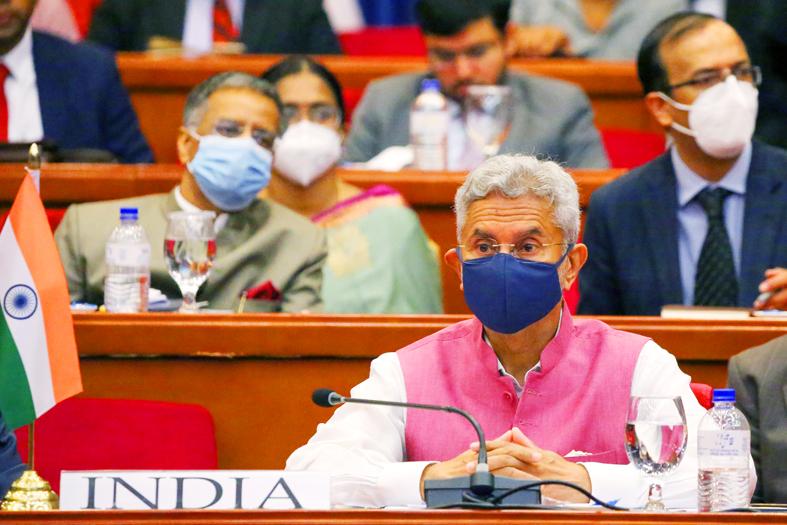India has signed an agreement to set up hybrid power projects on northern Sri Lankan islands in a deal seen as a strategic victory in its competition with China for influence in the Indian Ocean.
Indian Minister of External Affairs Subrahmanyam Jaishankar, who is in Colombo for bilateral meetings, witnessed the signing, along with Sri Lankan Minister of Foreign Affairs Gamini Peiris, the Indian embassy said late on Monday.
In December, China announced its own project to build power plants on three Sri Lankan islands was suspended due to security concerns involving a “third party.”

Photo: EPA-EFE
An Indian official said he could not confirm if the plants in the new agreement are to be built on the same islands earmarked for the Chinese project. The power source and other details on the projects were not available.
India considers Sri Lanka, just across the narrow Palk Strait off India’s southeastern coast, to be in its sphere of influence, while the island nation in the middle of a key sea route connecting the east and west, is also important to China’s ambitious “One Belt, One Road” global infrastructure initiative.
“It is kind of substantial victory for India,” said Lynn Ockersz, a senior journalist and foreign relations analyst in Sri Lanka.
“Overall, it will be in a great position to influence Sri Lanka when it comes to policy issues affecting India,” he said.
Had the Chinese power plant project been realized, it would have placed China next to India’s southern coast. India and China already have running border disputes in other regions.
Jaishankar is also taking part in the 18th Bay of Bengal Initiative for Multi-Sectoral Technical and Economic Cooperation, a meeting of Bay of Bengal nations Bangladesh, Bhutan, India, Myanmar, Nepal, Sri Lanka and Thailand for economic cooperation.
The other agreements India signed include providing a maritime rescue coordination center and building fisheries harbors in Sri Lanka.
The agreements come amid Sri Lanka’s worst economic crisis in recent memory with shortages of medicine, fuel and milk power, and daily power outages lasting for hours.
Sri Lanka has approached both India and China for help. India provided a US$1 billion credit line to buy essentials following a previous US$500 billion to buy fuel. China is considering a request for a US$2.5 billion economic assistance from Sri Lanka.
Infrastructure projects that were built on Chinese loans, but do not make money are blamed for its debt crisis. Sri Lanka’s foreign reserves are dwindling, but it has to repay US$7 billion in foreign debts this year.
China has been non-committal to a request for debt restructuring.
Beijing has invested billions of dollars in building a sea port, airport, roads and a port city on reclaimed land near Colombo harbor, which the Sri Lankan government aims to develop into a financial city.
The Sri Lankan government previously scrapped a plan to allow China outright ownership to land on the Colombo Port City and provided 62 hectares on a 99-year lease instead.

GROWING OWINGS: While Luxembourg and China swapped the top three spots, the US continued to be the largest exposure for Taiwan for the 41st consecutive quarter The US remained the largest debtor nation to Taiwan’s banking sector for the 41st consecutive quarter at the end of September, after local banks’ exposure to the US market rose more than 2 percent from three months earlier, the central bank said. Exposure to the US increased to US$198.896 billion, up US$4.026 billion, or 2.07 percent, from US$194.87 billion in the previous quarter, data released by the central bank showed on Friday. Of the increase, about US$1.4 billion came from banks’ investments in securitized products and interbank loans in the US, while another US$2.6 billion stemmed from trust assets, including mutual funds,

AI TALENT: No financial details were released about the deal, in which top Groq executives, including its CEO, would join Nvidia to help advance the technology Nvidia Corp has agreed to a licensing deal with artificial intelligence (AI) start-up Groq, furthering its investments in companies connected to the AI boom and gaining the right to add a new type of technology to its products. The world’s largest publicly traded company has paid for the right to use Groq’s technology and is to integrate its chip design into future products. Some of the start-up’s executives are leaving to join Nvidia to help with that effort, the companies said. Groq would continue as an independent company with a new chief executive, it said on Wednesday in a post on its Web

RESPONSE: The Japanese Ministry of Finance might have to intervene in the currency markets should the yen keep weakening toward the 160 level against the US dollar Japan’s chief currency official yesterday sent a warning on recent foreign exchange moves, after the yen weakened against the US dollar following Friday last week’s Bank of Japan (BOJ) decision. “We’re seeing one-directional, sudden moves especially after last week’s monetary policy meeting, so I’m deeply concerned,” Japanese Vice Finance Minister for International Affairs Atsushi Mimura told reporters. “We’d like to take appropriate responses against excessive moves.” The central bank on Friday raised its benchmark interest rate to the highest in 30 years, but Bank of Japan Governor Kazuo Ueda chose to keep his options open rather than bolster the yen,

Even as the US is embarked on a bitter rivalry with China over the deployment of artificial intelligence (AI), Chinese technology is quietly making inroads into the US market. Despite considerable geopolitical tensions, Chinese open-source AI models are winning over a growing number of programmers and companies in the US. These are different from the closed generative AI models that have become household names — ChatGPT-maker OpenAI or Google’s Gemini — whose inner workings are fiercely protected. In contrast, “open” models offered by many Chinese rivals, from Alibaba (阿里巴巴) to DeepSeek (深度求索), allow programmers to customize parts of the software to suit their